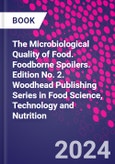The Microbiological Quality of Food: Foodborne Spoilers covers the microbiological spoilage of foods, with a focus on the spoilers, the foods themselves, and the signs of spoilage. The book addresses traditional spoilers (filamentous fungi, spore-forming bacteria, yeasts, SSO in fish), as well as some emerging spoilers (Pseudomonas), now recognized as primary targets. Sections also provide a brief overview of important foods (vegetables, milk and dairy products, meat, and fish) and addresses safety and economic loss. Details on the signs of spoilage, how to prevent spoilers, and methods of detecting spoilage and spoilage microorganisms in foods are also presented.
This is an authoritative reference for researchers, scientists and students who need to understand microbial spoilage, the impact of biofilm on the quality and safety of many foods, and the implications of biofilm for spoilage and shelf life. Hot topics covered by this book include the possible link between food spoilage and food safety as a consequence of antibiotic resistance spreading all over the world.
Please Note: This is an On Demand product, delivery may take up to 11 working days after payment has been received.
Table of Contents
1. Microbial Spoilage of Foods: Fundamentals
Part I: The Spoilers
2. Pseudomonas and Related Genera
3. Specific Spoilage Organisms (SSOs) in Fish
4. Spore-Forming Bacteria
5. Yeasts
6. Molds
Part II: A Focus on Food Spoilage
7. Spoilage of Milk and Dairy Products
8. Spoilage of Meat and Fish
9. Review of Vegetable Fermentations With Particular Emphasis on Processing Modifications, Microbial Ecology, and Spoilage
10. Wine Spoiling Phenomena
Part III: Future Trends in Food Spoilers
11. The Impact of Biofilms on Food Spoilage
12. Food Spoilage and Food Safety: Is There a Link?








